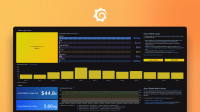Caution
Grafana Alloy is the new name for our distribution of the OTel collector. Grafana Agent has been deprecated and is in Long-Term Support (LTS) through October 31, 2025. Grafana Agent will reach an End-of-Life (EOL) on November 1, 2025. Read more about why we recommend migrating to Grafana Alloy.
Important: This documentation is about an older version. It's relevant only to the release noted, many of the features and functions have been updated or replaced. Please view the current version.
discovery.docker
discovery.docker discovers Docker Engine containers and exposes them as targets.
Usage
discovery.docker "LABEL" {
host = DOCKER_ENGINE_HOST
}Arguments
The following arguments are supported:
| Name | Type | Description | Default | Required |
|---|---|---|---|---|
host | string | Address of the Docker Daemon to connect to. | yes | |
port | number | Port to use for collecting metrics when containers don’t have any port mappings. | 80 | no |
host_networking_host | string | Host to use if the container is in host networking mode. | "localhost" | no |
refresh_interval | duration | Frequency to refresh list of containers. | "1m" | no |
bearer_token | secret | Bearer token to authenticate with. | no | |
bearer_token_file | string | File containing a bearer token to authenticate with. | no | |
proxy_url | string | HTTP proxy to proxy requests through. | no | |
follow_redirects | bool | Whether redirects returned by the server should be followed. | true | no |
enable_http2 | bool | Whether HTTP2 is supported for requests. | true | no |
At most one of the following can be provided:
Blocks
The following blocks are supported inside the definition of
discovery.docker:
| Hierarchy | Block | Description | Required |
|---|---|---|---|
| filter | filter | Filters discoverable resources. | no |
| basic_auth | basic_auth | Configure basic_auth for authenticating to the endpoint. | no |
| authorization | authorization | Configure generic authorization to the endpoint. | no |
| oauth2 | oauth2 | Configure OAuth2 for authenticating to the endpoint. | no |
| oauth2 > tls_config | tls_config | Configure TLS settings for connecting to the endpoint. | no |
The > symbol indicates deeper levels of nesting. For example,
oauth2 > tls_config refers to a tls_config block defined inside
an oauth2 block.
filter block
The filter block configures a filter to pass to the Docker Engine to limit
the amount of containers returned. The filter block can be specified multiple
times to provide more than one filter.
| Name | Type | Description | Default | Required |
|---|---|---|---|---|
name | string | Filter name to use. | yes | |
values | list(string) | Values to pass to the filter. | yes |
Refer to List containers from the Docker Engine API documentation for the list of supported filters and their meaning.
basic_auth block
| Name | Type | Description | Default | Required |
|---|---|---|---|---|
username | string | Basic auth username. | no | |
password | secret | Basic auth password. | no | |
password_file | string | File containing the basic auth password. | no |
password and password_file are mutually exclusive and only one can be
provided inside of a basic_auth block.
authorization block
| Name | Type | Description | Default | Required |
|---|---|---|---|---|
type | string | Authorization type, for example, “Bearer”. | no | |
credentials | secret | Secret value. | no | |
credentials_file | string | File containing the secret value. | no |
credential and credentials_file are mutually exclusive and only one can be
provided inside of an authorization block.
oauth2 block
| Name | Type | Description | Default | Required |
|---|---|---|---|---|
client_id | string | OAuth2 client ID. | no | |
client_secret | secret | OAuth2 client secret. | no | |
client_secret_file | string | File containing the OAuth2 client secret. | no | |
scopes | list(string) | List of scopes to authenticate with. | no | |
token_url | string | URL to fetch the token from. | no | |
endpoint_params | map(string) | Optional parameters to append to the token URL. | no | |
proxy_url | string | Optional proxy URL for OAuth2 requests. | no |
client_secret and client_secret_file are mutually exclusive and only one
can be provided inside of an oauth2 block.
The oauth2 block may also contain its own separate tls_config sub-block.
tls_config block
| Name | Type | Description | Default | Required |
|---|---|---|---|---|
ca_pem | string | CA PEM-encoded text to validate the server with. | no | |
ca_file | string | CA certificate to validate the server with. | no | |
cert_pem | string | Certificate PEM-encoded text for client authentication. | no | |
cert_file | string | Certificate file for client authentication. | no | |
key_pem | secret | Key PEM-encoded text for client authentication. | no | |
key_file | string | Key file for client authentication. | no | |
server_name | string | ServerName extension to indicate the name of the server. | no | |
insecure_skip_verify | bool | Disables validation of the server certificate. | no | |
min_version | string | Minimum acceptable TLS version. | no |
The following pairs of arguments are mutually exclusive and cannot both be set simultaneously:
ca_pemandca_filecert_pemandcert_filekey_pemandkey_file
When configuring client authentication, both the client certificate (using
cert_pem or cert_file) and the client key (using key_pem or key_file)
must be provided.
When min_version is not provided, the minimum acceptable TLS version is
inherited from Go’s default minimum version, TLS 1.2. If min_version is
provided, it must be set to one of the following strings:
"TLS10"(TLS 1.0)"TLS11"(TLS 1.1)"TLS12"(TLS 1.2)"TLS13"(TLS 1.3)
Exported fields
The following fields are exported and can be referenced by other components:
| Name | Type | Description |
|---|---|---|
targets | list(map(string)) | The set of targets discovered from the docker API. |
Each target includes the following labels:
__meta_docker_container_id: ID of the container.__meta_docker_container_name: Name of the container.__meta_docker_container_network_mode: Network mode of the container.__meta_docker_container_label_<labelname>: Each label from the container.__meta_docker_network_id: ID of the Docker network the container is in.__meta_docker_network_name: Name of the Docker network the container is in.__meta_docker_network_ingress: Set totrueif the Docker network is an ingress network.__meta_docker_network_internal: Set totrueif the Docker network is an internal network.__meta_docker_network_label_<labelname>: Each label from the network the container is in.__meta_docker_network_scope: The scope of the network the container is in.__meta_docker_network_ip: The IP of the container in the network.__meta_docker_port_private: The private port on the container.__meta_docker_port_public: The publicly exposed port from the container, if a port mapping exists.__meta_docker_port_public_ip: The public IP of the container, if a port mapping exists.
Each discovered container maps to one target per unique combination of networks and port mappings used by the container.
Component health
discovery.docker is only reported as unhealthy when given an invalid
configuration. In those cases, exported fields retain their last healthy
values.
Debug information
discovery.docker does not expose any component-specific debug information.
Debug metrics
discovery.docker does not expose any component-specific debug metrics.
Examples
Linux or macOS hosts
This example discovers Docker containers when the host machine is macOS or Linux:
discovery.docker "containers" {
host = "unix:///var/run/docker.sock"
}
prometheus.scrape "demo" {
targets = discovery.docker.containers.targets
forward_to = [prometheus.remote_write.demo.receiver]
}
prometheus.remote_write "demo" {
endpoint {
url = PROMETHEUS_REMOTE_WRITE_URL
basic_auth {
username = USERNAME
password = PASSWORD
}
}
}Replace the following:
PROMETHEUS_REMOTE_WRITE_URL: The URL of the Prometheus remote_write-compatible server to send metrics to.USERNAME: The username to use for authentication to the remote_write API.PASSWORD: The password to use for authentication to the remote_write API.
Windows hosts
This example discovers Docker containers when the host machine is Windows:
discovery.docker "containers" {
host = "tcp://localhost:2375"
}
prometheus.scrape "demo" {
targets = discovery.docker.containers.example.targets
forward_to = [prometheus.remote_write.demo.receiver]
}
prometheus.remote_write "demo" {
endpoint {
url = PROMETHEUS_REMOTE_WRITE_URL
basic_auth {
username = USERNAME
password = PASSWORD
}
}
}Replace the following:
PROMETHEUS_REMOTE_WRITE_URL: The URL of the Prometheus remote_write-compatible server to send metrics to.USERNAME: The username to use for authentication to the remote_write API.PASSWORD: The password to use for authentication to the remote_write API.
NOTE: This example requires the “Expose daemon on tcp://localhost:2375 without TLS” setting to be enabled in the Docker Engine settings.



